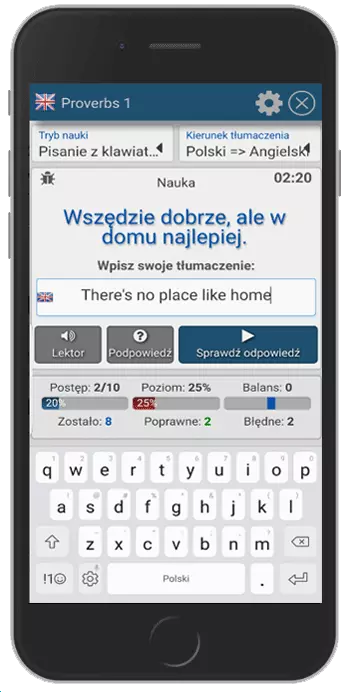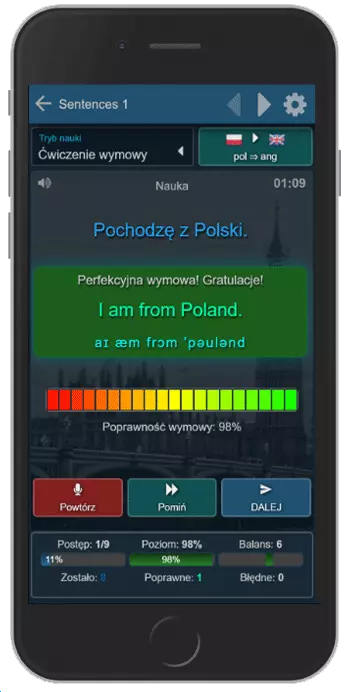
 "Dzieci" w języku polskim:
"Dzieci" w języku polskim:| Angielskie słówko [transkrypcja fonetyczna] | |
|---|---|
 |
childhood ['ʧaɪldhud] |
 |
childish ['ʧaɪldɪʃ] |
 |
children ['ʧɪldrən] |
 |
kiddy ['kɪdɪ] |
 |
woodpecker ['wudpɛkə(r)] |
 |
childlish |
 |
childishly |
 |
childishness [childishness] |
 |
kids [kɪdz] |
 |
childlish |
 |
street child |
 |
The children are playing in the garden |
 |
babyish ['beɪbɪɪʃ] |
 |
dead easy [dɛd 'i:zɪ] |
 |
children ['ʧɪldrən] |
 |
The children are on a tour of the fire department. |
 |
The children are on this passport. |
 |
The children are imagining that they're sailing in the ocean. |
 |
children must attend school |
 |
children attending kindergarten |
 |
The children always get restless when we are travelling [ðə 'ʧɪldrən 'ɔ:lweɪz gɛt 'rɛstləs wɛn wi: ɑ:(r) 'trævəlɪŋ] |
 |
childlike trust |
 |
children confuse difficult word |
 |
little ones |
 |
the children pitched into the food |
 |
children fear to tell their parent the truth about marks |
 |
The children were playing in the garden when someone shouted very loudly. |
 |
The children are very excited about their school trip |
 |
The children looked very tired when they got back from the trip. |
 |
early years ['ə:lɪ jɪrz] |
 |
Dziatwa |
 |
children often try to avoid doing their homework |
 |
infantile ['ɪnfəntɪl] |
 |
the children were left unattended [ðə 'ʧɪldrən wə:(r) lɛft ənə'tɛndɪd] |
 |
children are harmed when their parents divorce ['ʧɪldrən ɑ:(r) hɑ:md wɛn ðɛə(r) 'pɛərənts dɪ'vɔ:s] |
 |
The children usually sit around the tree [ðə 'ʧɪldrən 'jju:ʒəwəlɪ sɪt ər'aund ðə tri:] |
 |
Children often scrape their elbows ['ʧɪldrən 'ɔ:fən skreɪp ðɛə(r) 'ɛlbəuz] |
 |
Kids throw stones at one another [kɪdz θrəu stəunz æt wʌn ə'nʌðə(r)] |
 |
Children slide on ice in winter ['ʧɪldrən slaɪd ɔn aɪs ɪn 'wɪntə(r)] |
 |
Children sometimes ask embarrassing or awkward question ['ʧɪldrən sɪm'taɪmz æsk ɪm'bærəsɪŋ ɔ:(r) 'ɔkwərd 'kwɛsʧən] |
 |
children with special needs ['ʧɪldrən wɪð 'spɛʃl ni:dz] |
 |
Children resemble their parents ['ʧɪldrən rɪ'zɛmbl ðɛə(r) 'pɛərənts] |
 |
deprived children [dɪp'raɪvd 'ʧɪldrən] |
 |
children aged from 5 to 10 ['ʧɪldrən eɪʤd frɔm 5 tu 10] |
 |
school-agers [sku:l 'eɪʤərz] |
 |
children's [children's] |
 |
child star [ʧaɪld stɑ:] |
 |
kid [kɪd] |
 |
settle down, children! ['sɛtl daun 'ʧɪldrən] |
 |
childish ['ʧaɪldɪʃ] |
 |
it is a piece of cake [ɪt ɪz ə pi:s ɔv keɪk] |
 |
The kids help me to get the meal done [ðə kɪdz hɛlp mi: tu gɛt ðə mi:l dʌn] |
 |
Children are loved by parents. ['ʧɪldrən ɑ:(r) lʌvd baɪ 'pɛərənts] |
 |
children do not have capacity to distinguish between fact and fiction ['ʧɪldrən du: nɔt hæv kə'pæsɪtɪ tu dɪs'tɪŋgwɪʃ bɪt'wi:n fækt ænd 'fɪkʃən] |
 |
Children have different school lunches ['ʧɪldrən hæv 'dɪfərənt sku:l 'lʌnʧɪz] |
 |
Children in uniforms ['ʧɪldrən ɪn 'jju:nəfɔ:rmz] |
 |
The children don't want [ðə 'ʧɪldrən don't wɔnt] |
 |
The kids are playing in the garden. [ðə kɪdz ɑ:(r) 'pleɪɪŋ ɪn ðə 'gɑ:dn] |
 |
children welcome ['ʧɪldrən 'wɛlkəm] |
 |
Children are not at home. Children aren't at home. Are children at home? ['ʧɪldrən ɑ:(r) nɔt æt həum 'ʧɪldrən aren't æt həum ɑ:(r) 'ʧɪldrən æt həum] |
 |
The children are cared for by experienced and qualified staff. [ðə 'ʧɪldrən ɑ:(r) kɛrd fɔ:(r) baɪ ɪks'pɪrɪənst ænd 'kwɔləfaɪd stɑ:f] |
 |
Baby Jesus ['beɪbɪ 'ʤi:zəs] |
 |
The children are usually in bed at eight o'clock. [ðə 'ʧɪldrən ɑ:(r) 'jju:ʒəwəlɪ ɪn bɛd æt eɪt ək'lɔk] |
 |
The children usually go to bed at half past seven. [ðə 'ʧɪldrən 'jju:ʒəwəlɪ gəu tu bɛd æt hɑ:f pɑ:st 'sɛvən] |
 |
The children want to play table tennis [ðə 'ʧɪldrən wɔnt tu pleɪ 'teɪbl 'tɛnɪs] |
 |
Children don't put the toy in their mouth ['ʧɪldrən dəunt put ðə tɔɪ ɪn ðɛə(r) mauθ] |
 |
Children often play outdoors. It's good for their health ['ʧɪldrən 'ɔ:fən pleɪ 'autdɔ:z ɪts gud fɔ:(r) ðɛə(r) hɛlθ] |
 |
The children are playing football. [ðə 'ʧɪldrən ɑ:(r) 'pleɪɪŋ 'futbɔ:l] |
 |
The children could be better swimmers if they went to the pool more frequently. [ðə 'ʧɪldrən kud bi: 'bɛtə(r) 'swɪmərz ɪf ðeɪ wɛnt tu ðə pu:l mɔ:(r) 'fri:kwəntlɪ] |
 |
The children are at school. [ðə 'ʧɪldrən ɑ:(r) æt sku:l] |
 |
The children are at school. [ðə 'ʧɪldrən ɑ:(r) æt sku:l] |
 |
kids are messy [kɪdz ɑ:(r) 'mɛsɪ] |
 |
white-backed woodpecker [waɪt bækt 'wudpɛkə(r)] |
 |
schoolchildren ['sku:lʧɪldrən] |
 |
Children learn by observing adults. ['ʧɪldrən lə:n baɪ əb'zə:vɪŋ ə'dʌlts] |
 |
The children couldn't get to their school [ðə 'ʧɪldrən 'kudənt gɛt tu ðɛə(r) sku:l] |
 |
Children should be subjected to some form of safety education . ['ʧɪldrən ʃud bi: sɪ'bʤɛktɪd tu sʌm fɔ:m ɔv 'seɪftɪ ɛʤə'keɪʃən] |
 |
Children need lots of encouragement from their parents. ['ʧɪldrən ni:d lɔts ɔv en'kʌrɪʤmənt frɔm ðɛə(r) 'pɛərənts] |
 |
die Kindheit [daɪ Kindheit] |
 |
The kids had great time in the sea, playing in the water [ðə kɪdz hæd greɪt taɪm ɪn ðə si: 'pleɪɪŋ ɪn ðə 'wɔ:tə(r)] |
 |
underprivileged children [underprivileged 'ʧɪldrən] |
 |
nipper |



